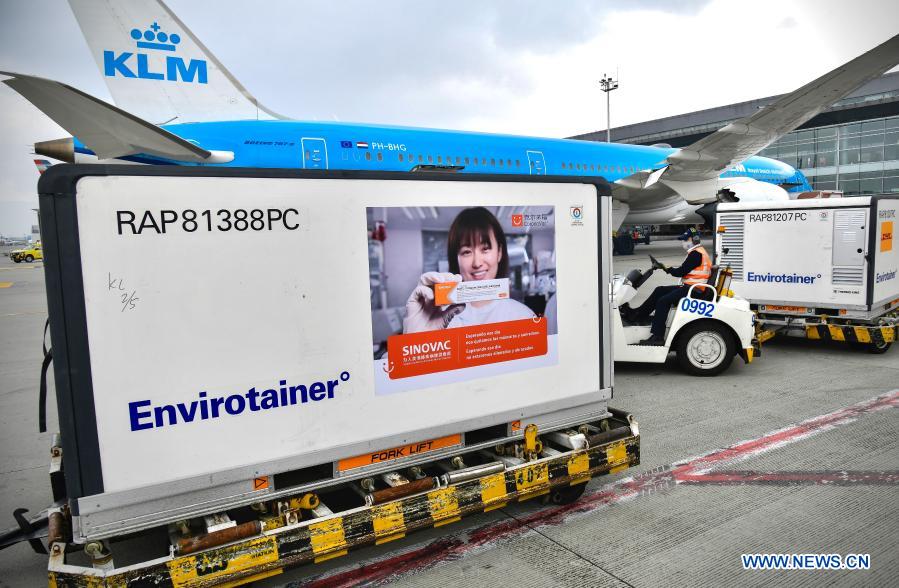


Photo taken on March 6, 2021 shows a container of the second batch of COVID-19 vaccines from Chinese company Sinovac at the El Dorado International Airport in Bogota, Colombia. The second batch of COVID-19 vaccines from Chinese company Sinovac arrived at Bogota on Saturday. (Colombian Presidential Office/Handout via Xinhua)
MEXICO CITY, March 6 (Xinhua) -- After the second batch of Sinovac vaccines arrived in Colombia on Saturday afternoon, 11 countries in Latin America and the Caribbean (LAC) region have received Chinese vaccines, which are nicknamed by some regional countries as "doses of hope."
The vaccines came at a time when new waves of COVID-19 outbreaks and more contagious variants are emerging in the region while the deliveries of doses the LAC countries ordered from the West are delayed.
Meeting the utmost need of the LAC countries in the anti-pandemic fight, China's helping hand not only demonstrates its long-term friendship and solidarity with the region, but also embodies its commitment of making the vaccines a global public good.
So far, the region's total caseload has surpassed 22 million with daily cases and deaths still surging. More worrying is the virus mutation reported in Brazil, a populous country that has already recorded the most infections on the continent.
As medical systems in many LAC countries are under unprecedented stress, the earlier and the more people are vaccinated, the safer people will be and the sooner a country is expected to return to normal.
Therefore, since January, Chinese vaccines have been granted emergency use approval in several LAC countries. And upon arrival, they were immediately distributed across countries as part of mass vaccination drives for prioritized groups.
From the hardest-hit city Ecatepec in Mexico to Easter Island in Chile and from the jungle in Brazil's Amazon region to Buenos Aires in Argentina, hundreds of thousands of frontline healthcare workers, teachers, indigenous people and seniors who are more vulnerable to the virus have received the doses from China.
A year after the world was jolted by the sudden outbreak of COVID-19, humanity faces a new test: establishing global immunity.
United Nations Secretary-General Antonio Guterres, during a virtual meeting in February, described "vaccine equity" as "the biggest moral test before the global community," saying the distribution has been "wildly uneven and unfair."
Developing countries, including those in Latin America, are obviously at a disadvantage. Deputy Executive Secretary of the Economic Commission for Latin America and the Caribbean Mario Cimoli has said that of the 6.5 billion doses of the vaccine produced worldwide, Latin America has only 11 percent under contract and Africa, 4 percent.
Mexican Foreign Minister Marcelo Ebrard has called for stopping the "monopolization of vaccines" and urged to give priority to countries with limited resources.
As a country with limited resources in the past and now the biggest developing one, China values its pledge to build a community with a shared future for humanity and strive for a better world.
In the anti-pandemic fight, China has walked its talk not only by helping other countries, including those in Latin America and the Caribbean, with medical supplies and expert teams at the early stage of the fight, but also by providing vaccines to countries in need.
Demonstrating the long-term friendship between Beijing and its LAC peers, the arrival of Chinese vaccines also demonstrates that countries with vastly different cultures and political systems can trust each other and enjoy cooperation despite the geographic distance as long as they seek consensus on priorities, for example putting people's lives first.

 Award-winning photos show poverty reduction achievements in NE China's Jilin province
Award-winning photos show poverty reduction achievements in NE China's Jilin province People dance to greet advent of New Year in Ameiqituo Town, Guizhou
People dance to greet advent of New Year in Ameiqituo Town, Guizhou Fire brigade in Shanghai holds group wedding
Fire brigade in Shanghai holds group wedding Tourists enjoy ice sculptures in Datan Town, north China
Tourists enjoy ice sculptures in Datan Town, north China Sunset scenery of Dayan Pagoda in Xi'an
Sunset scenery of Dayan Pagoda in Xi'an Tourists have fun at scenic spot in Nanlong Town, NW China
Tourists have fun at scenic spot in Nanlong Town, NW China Harbin attracts tourists by making best use of ice in winter
Harbin attracts tourists by making best use of ice in winter In pics: FIS Alpine Ski Women's World Cup Slalom
In pics: FIS Alpine Ski Women's World Cup Slalom Black-necked cranes rest at reservoir in Lhunzhub County, Lhasa
Black-necked cranes rest at reservoir in Lhunzhub County, Lhasa China's FAST telescope will be available to foreign scientists in April
China's FAST telescope will be available to foreign scientists in April